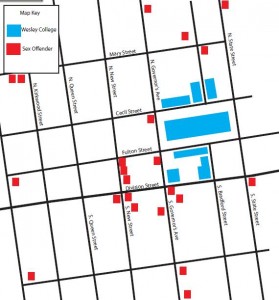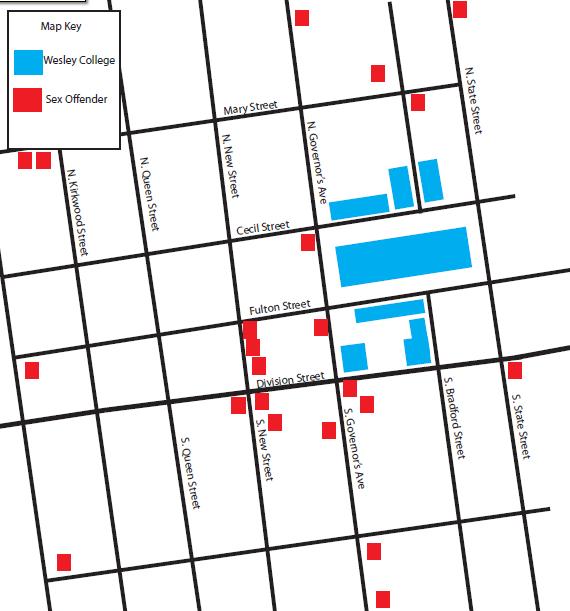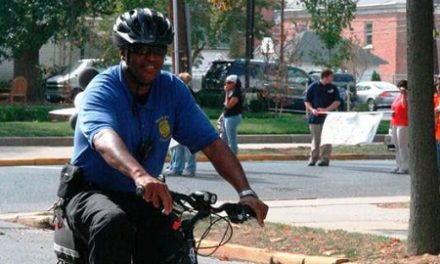 By:Â Erick Huber & Kim Manahan (Whetstone Staff Writers)
By:Â Erick Huber & Kim Manahan (Whetstone Staff Writers)
Not only does Wesley campus border the two highest crime districts in the city, there are at least 40 sex offenders who live within a half-mile radius surrounding the college.
Twelve of those sex offenders, whose crimes include rape, live within 1,000 feet of the campus.
Seven of the 40 are considered to be high-risk offenders.
According to familywatchdog.us and nsopw.gov, Web sites that list registered sex offenders, a 32-year-old man lives across the street from Zimmerman Hall and the Campus Community School, which includes children who attend the first through eighth grades.
This man has been convicted of third-degree rape of a child between the ages 1 and 11.
“I’m not sure of the zoning laws that deal with them, but I don’t think he should be there,†said Sam Crawford, security supervisor at Wesley College.
There are no registered offenders who work or attend Wesley, said Walter Beaupre, director of safety and security.
The college’s annual security report notifies students of nearby offenders.
“The best thing is to make the campus community aware of the registry and every one can view it,†Beaupre said. “[The offenders] are registered if they are convicted of a sex crime under the Delaware law.â€
According to the Delaware sex offender registry (http://sexoffender.dsp.delaware.gov/start.htm), a 61-year-old high-risk offender and repeat offender lives across the street from the tennis courts. Each of his victims has been between 12 and 15.
Dover police say they are well aware of the situation around Wesley campus.
“There are gangs, drug houses, shootings, prostitutes and all that type of stuff going on all around Wesley,†said Dover police officer Brian Allen “It’s important for the students to know this so they can be more aware of their surroundings.â€
In his seven years patrolling the streets around Wesley College, Allen knows firsthand how dangerous the area can get.
“In fact,†he said, “there was a murder right off the Wesley campus in the spring of ‘09, so it’s very important for students to know their limitations and boundaries if they plan on going out.â€
There are specific rules regarding weapon possession in the student handbook.
Students are not allowed to use or possess “ammunition, firearms or items that resemble firearms, illegal knives (knives with blades longer than five and one half inches, hand instruments designed to cut or stab another by being throw, stilettos, poniards, Bowie knives, swords, and/or spears), or other illegal weapons on college property.â€
There is no self-defense law in Delaware. This means you have to find all the possibilities of escape first before fighting back, unless you are in your home.
Despite all the rules and circumstances against carrying weapons, Crawford recommends them.
“I especially recommend them for females,†he said. “They are usually more sought after for attacks and it’s just another means of a defense for them.â€
Dover Detective Jennifer King, however, says, “students should never use or carry a weapon because they often are the cause of more trouble. They could always be taken and then used on the student as well.â€
Wesley also has six blue light boxes located around campus that people may use to alert security. The phone sends a direct call to the security office. If no one picks up after three rings, it sends a call to the Dover Police and connects to a security officer’s walkie-talkie or cell phone at Wesley.
“The only thing is, when someone calls from one of them, I only know they are in one of the six locations around campus,†Crawford said. “Only the box’s phone number comes up on my end. The same thing goes for the police when they see the call.â€
Crawford said the only calls security has gotten from them have been prank calls.
In the past year, there has been one sexual assault reported on campus.
It involved two students, a man and a woman, in September.
“It was reported to have happened in an on-campus residence hall,†Beaupre said. “The police were notified, and as a result of the investigation, there were no charges pressed.â€
The campus community is notified of the crime by text message if the school does not know who committed the act, Beaupre said.
“If we know who the offender is, the offender will be given interim suspension and will not be allowed on campus,†Beaupre said. “If the person is no longer a threat, we would not send out an alert.â€
Beaupre said that the college has not had any problems with any nearby sex offenders.





